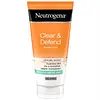What's inside
What's inside
 Key Ingredients
Key Ingredients

 Benefits
Benefits

 Concerns
Concerns

 Ingredients Side-by-side
Ingredients Side-by-side

Water
Skin ConditioningGlycerin
HumectantPropylene Glycol
HumectantCetyl Alcohol
EmollientC12-15 Alkyl Benzoate
AntimicrobialStearyl Alcohol
EmollientGlyceryl Stearate
EmollientPEG-100 Stearate
C12-15 Alkyl Lactate
EmollientAloe Barbadensis Leaf Extract
EmollientChamomilla Recutita Extract
Skin ConditioningCetyl Lactate
EmollientCocamidopropyl Pg-Dimonium Chloride Phosphate
Salicylic Acid
MaskingMenthyl Lactate
MaskingDimethicone
EmollientCyclohexasiloxane
EmollientCyclopentasiloxane
EmollientSodium Isostearoyl Lactylate
EmulsifyingPropylene Glycol Isostearate
Skin ConditioningPalmitic Acid
EmollientStearic Acid
CleansingCarbomer
Emulsion StabilisingAcrylates/C10-30 Alkyl Acrylate Crosspolymer
Emulsion StabilisingSodium Chloride
MaskingDisodium EDTA
Sodium Hydroxide
BufferingBenzalkonium Chloride
AntimicrobialMethylparaben
PreservativePropylparaben
PreservativeEthylparaben
PreservativePhenoxyethanol
PreservativeParfum
MaskingBenzyl Alcohol
PerfumingWater, Glycerin, Propylene Glycol, Cetyl Alcohol, C12-15 Alkyl Benzoate, Stearyl Alcohol, Glyceryl Stearate, PEG-100 Stearate, C12-15 Alkyl Lactate, Aloe Barbadensis Leaf Extract, Chamomilla Recutita Extract, Cetyl Lactate, Cocamidopropyl Pg-Dimonium Chloride Phosphate, Salicylic Acid, Menthyl Lactate, Dimethicone, Cyclohexasiloxane, Cyclopentasiloxane, Sodium Isostearoyl Lactylate, Propylene Glycol Isostearate, Palmitic Acid, Stearic Acid, Carbomer, Acrylates/C10-30 Alkyl Acrylate Crosspolymer, Sodium Chloride, Disodium EDTA, Sodium Hydroxide, Benzalkonium Chloride, Methylparaben, Propylparaben, Ethylparaben, Phenoxyethanol, Parfum, Benzyl Alcohol
Butyl Methoxydibenzoylmethane 3%
UV AbsorberHomosalate 10%
Skin ConditioningEthylhexyl Salicylate 5%
UV AbsorberOctocrylene 8%
UV AbsorberWater
Skin ConditioningBeeswax
Emulsion StabilisingAloe Barbadensis Leaf Juice
Skin ConditioningIsopropyl Palmitate
EmollientCetearyl Alcohol
EmollientCyclopentasiloxane
EmollientCyclohexasiloxane
EmollientCeteareth-20
CleansingHydroxyacetophenone
AntioxidantCarbomer
Emulsion StabilisingBenzyl Alcohol
PerfumingSaccharide Isomerate
HumectantPhenoxyethanol
PreservativeSodium Stearoyl Glutamate
CleansingTriethanolamine
BufferingTocopheryl Acetate
AntioxidantSodium Chloride
MaskingCitric Acid
BufferingButyl Methoxydibenzoylmethane 3%, Homosalate 10%, Ethylhexyl Salicylate 5%, Octocrylene 8%, Water, Beeswax, Aloe Barbadensis Leaf Juice, Isopropyl Palmitate, Cetearyl Alcohol, Cyclopentasiloxane, Cyclohexasiloxane, Ceteareth-20, Hydroxyacetophenone, Carbomer, Benzyl Alcohol, Saccharide Isomerate, Phenoxyethanol, Sodium Stearoyl Glutamate, Triethanolamine, Tocopheryl Acetate, Sodium Chloride, Citric Acid
 Reviews
Reviews

Ingredients Explained
These ingredients are found in both products.
Ingredients higher up in an ingredient list are typically present in a larger amount.
Benzyl Alcohol is most commonly used as a preservative. It also has a subtle, sweet smell. Small amounts of Benzyl Alcohol is not irritating and safe to use in skincare products. Most Benzyl Alcohol is derived from fruits such as apricots.
Benzyl Alcohol has both antibacterial and antioxidant properties. These properties help lengthen the shelf life of products. Benzyl Alcohol is a solvent and helps dissolve other ingredients. It can also improve the texture and spreadability.
Alcohol comes in many different forms. Different types of alcohol will have different effects on skin. This ingredient is an astringent alcohol.
Using high concentrations of these alcohols are drying on the skin. They may strip away your skin's natural oils and even damage your skin barrier. Astringent alcohols may also irritate skin.
Other types of astringent alcohols include:
According to the National Rosacea Society based in the US, you should be mindful of products with these alcohols in the top half of ingredients.
Any type of sanitizing product will have high amounts of alcohol to help kill bacteria and viruses.
Learn more about Benzyl AlcoholCarbomer is a polymer of acrylic acid. Its main role is to create a gel consistency.
A high amount of carbomer can cause pilling or balling up of products. Don't worry, most products contain 1% or less of carbomer.
Cyclohexasiloxane is a type of silicone more commonly known as D6. It is an emollient and solvent.
Cyclohexasiloxane is used to evenly distribute ingredients throughout the product. When applied to the skin, Cyclohexasiloxane evaporates and leaves behind a silky feel.
As an emollient, it can help the skin feel soft and hydrated. It is also used to reduce frizz in hair products.
Learn more about CyclohexasiloxaneCyclopentasiloxane, or D5, is a silicone used to improve texture of products and trap moisture.
D5 is considered lightweight and volatile. Volatile means it evaporates quickly after application. Once evaporated, D5 leaves a thin barrier that helps keep skin hydrated.
It is also an emollient. Emollients help soften the skin and prevent water loss. Silicones create a silky texture in products. D5 helps other ingredients become more spreadable.
Studies show D5 is safe to use in skincare products. We recommend speaking with a skincare professional if you have concerns.
Learn more about CyclopentasiloxanePhenoxyethanol is a preservative that has germicide, antimicrobial, and aromatic properties. Studies show that phenoxyethanol can prevent microbial growth. By itself, it has a scent that is similar to that of a rose.
It's often used in formulations along with Caprylyl Glycol to preserve the shelf life of products.
Chances are, you eat sodium chloride every day. Sodium Chloride is also known as table salt.
This ingredient has many purposes in skincare: thickener, emulsifier, and exfoliator.
You'll most likely find this ingredient in cleansers where it is used to create a gel-like texture. As an emulsifier, it also prevents ingredients from separating.
There is much debate on whether this ingredient is comedogenic. The short answer - comedogenic ratings don't tell the whole story. Learn more about comegodenic ratings here.
The concensus about this ingredient causing acne seems to be divided. Research is needed to understand if this ingredient does cause acne.
Scrubs may use salt as the primary exfoliating ingredient.
Learn more about Sodium ChlorideWater. It's the most common cosmetic ingredient of all. You'll usually see it at the top of ingredient lists, meaning that it makes up the largest part of the product.
So why is it so popular? Water most often acts as a solvent - this means that it helps dissolve other ingredients into the formulation.
You'll also recognize water as that liquid we all need to stay alive. If you see this, drink a glass of water. Stay hydrated!
Learn more about Water